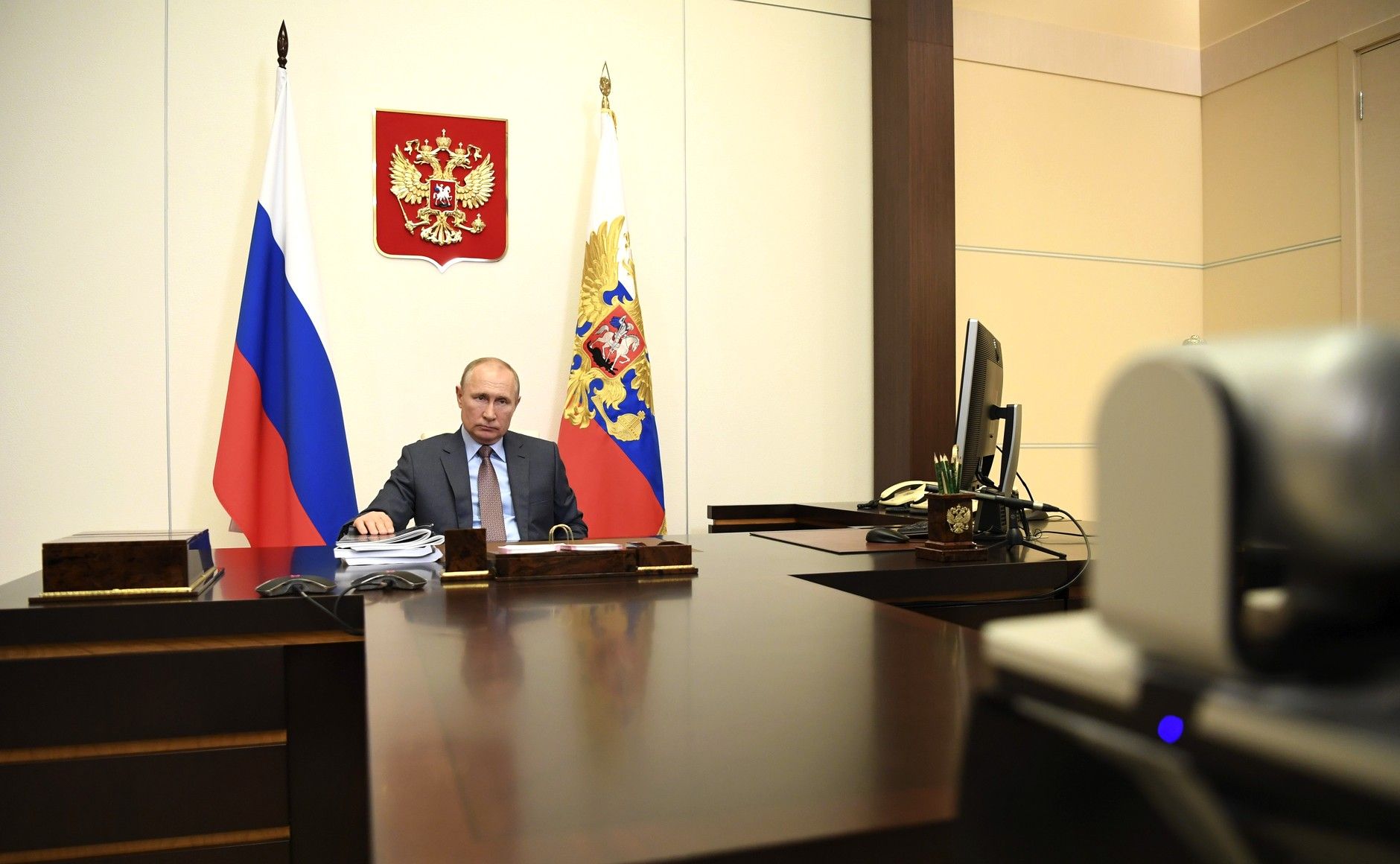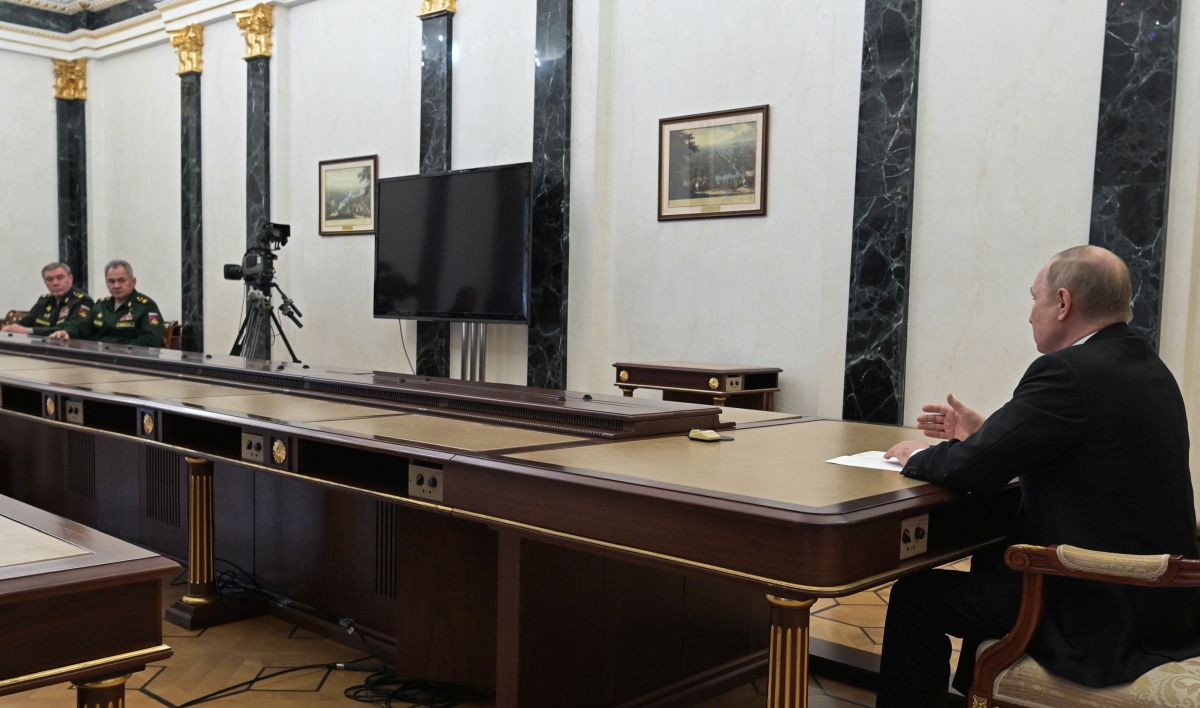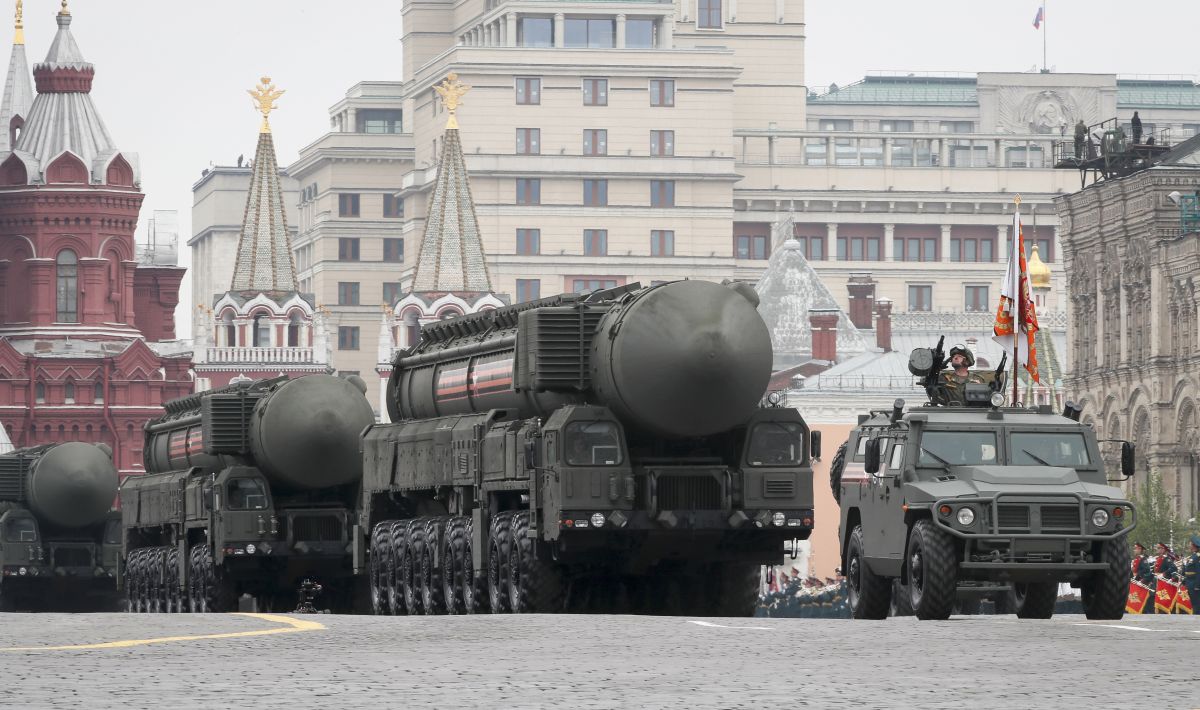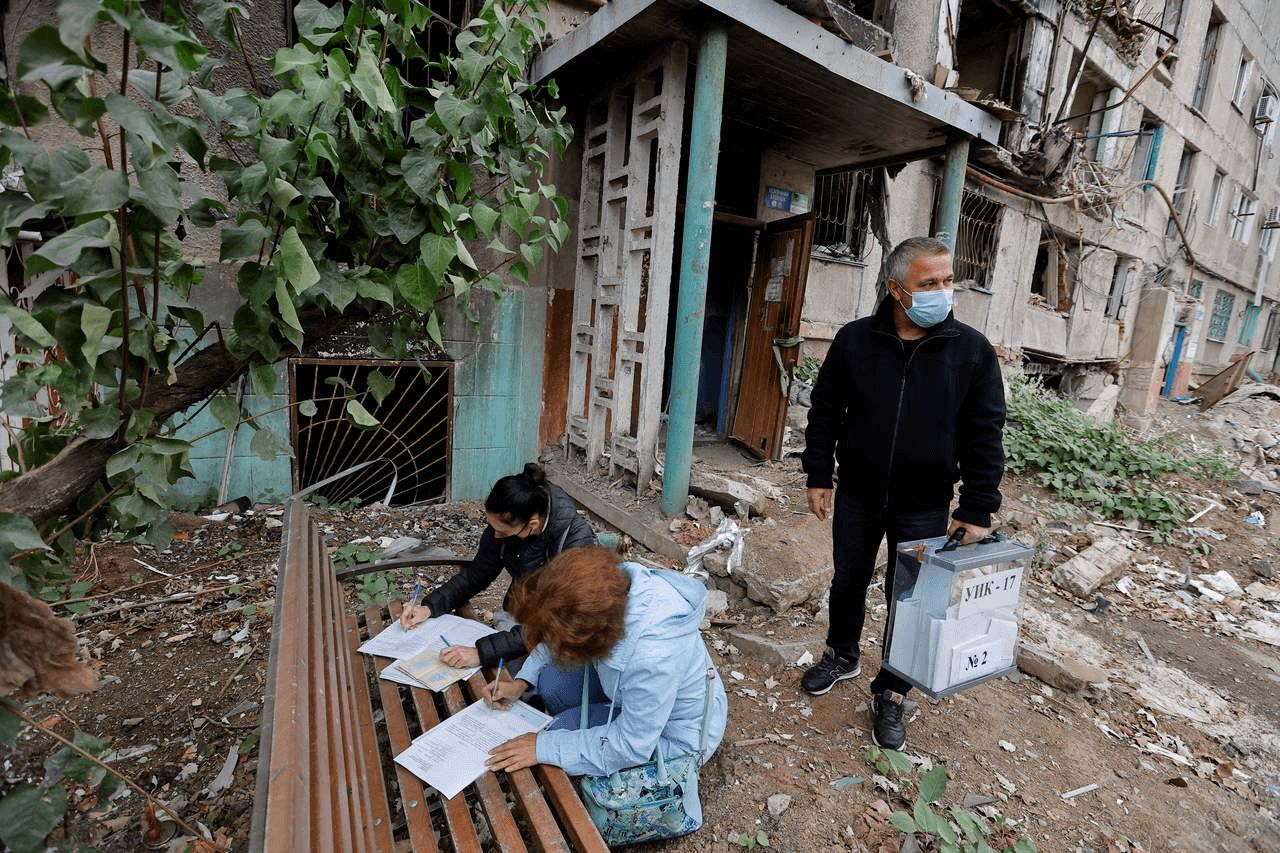Russia Threatens Ukraine with Nuclear Weapons
Russian threats increase the risk of nuclear weapons being used against Ukraine, but it still appears to be remote. Such an attack most likely would be preceded by more direct signals than Putin’s ambiguous warnings. Although such a strike would not guarantee a Russian victory, Putin might still order it in an act of desperation. To counter this risk, Russia must be convinced that a nuclear attack on Ukraine will trigger a strong international response, including conventional military intervention by the U.S. and its allies.
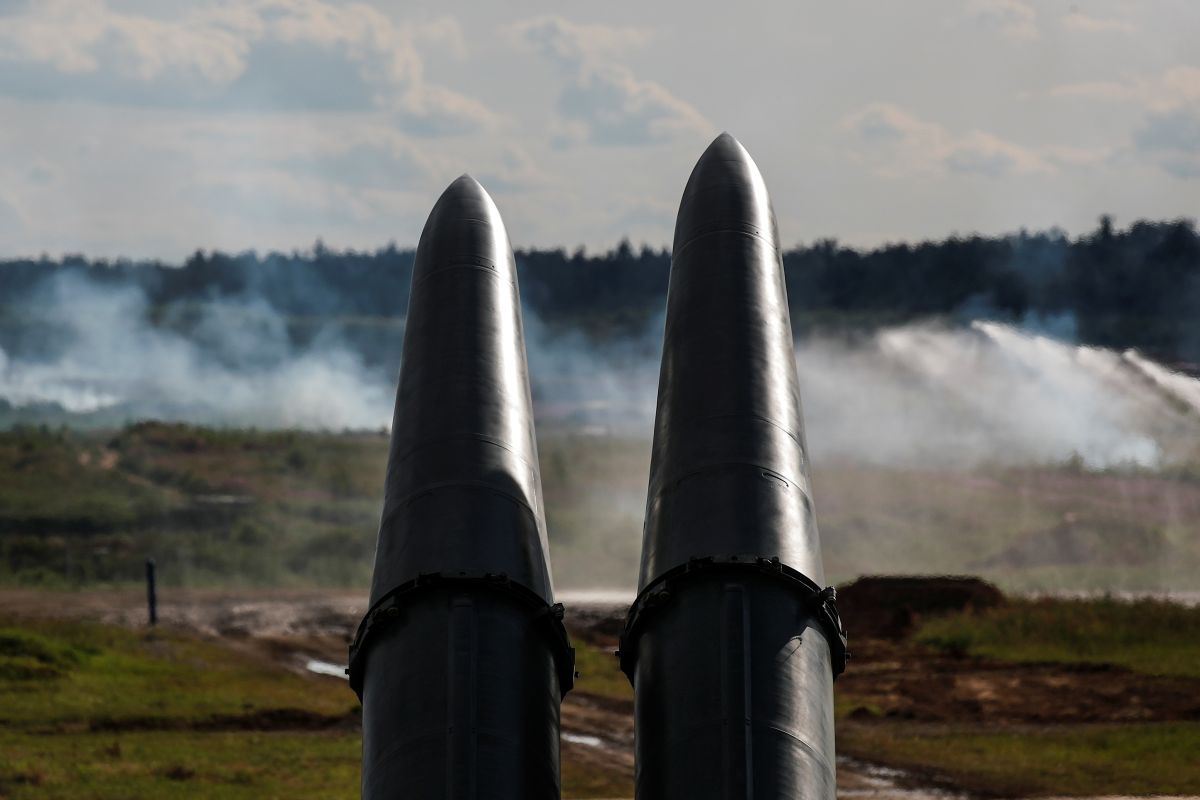 Fot. MAXIM SHEMETOV / Reuters / Forum
Fot. MAXIM SHEMETOV / Reuters / Forum
Threats Against Ukraine
At the signing of documents annexing four oblasts of Ukraine into Russia on 30 September, Vladimir Putin vowed to defend his country’s territorial integrity with all forces at his disposal (he made similar remarks on 21 September). He also said that by dropping atomic bombs on Japan in 1945, the U.S. had “created a precedent”. Such suggestions on the possibility of using nuclear weapons against Ukraine are supposed to deter it from further attempts to recapture its territory and heighten the fears of escalation in Western countries. Putin seems to hope to persuade the West to put pressure on Ukraine to start peace talks on terms favourable to Russia.
For over a week since the annexation, Russia has neither achieved any of these goals, nor used nuclear weapons. Putin apparently seeks to avoid their use and hopes that the mobilisation of about 300,000 troops will allow him to eventually stop and then push back the Ukrainian forces. It is not clear, however, whether in an extreme case he will be inclined to resort to nuclear weapons at a later stage of the conflict. While Ukraine recapturing its own territory does not pose a threat to the “very existence” of the Russian state—the official Russian threshold of use of nuclear weapons—Putin has described the ongoing war as of existential importance to Russia. He may also perceive defeat in Ukraine as a threat to the survival of his regime. If he is in fact ready to use nuclear weapons, then his territorial “red lines” are not known. Officially, Russia claims that the priority for its armed forces is to capture the whole Donbas, but it has not declared its borders in the Kherson and Zaporizhzhia oblasts. It seems that Crimea, annexed in 2014, retains the highest symbolic and strategic importance (due to the stationing of the Black Sea Fleet there) to Russia and Putin himself.
If Russia resorts to nuclear use, it will most likely issue more clear threats first (e.g., in the form of an ultimatum). Moreover, the U.S. and NATO have been informing that they have not noted any preparations of the Russian nuclear forces to attack (this could include deploying warheads on delivery vehicles or dispersal of the latter). Russia might even conduct such preparations ostentatiously or make other demonstrations (such as exercises of nuclear forces or even a nuclear test) to increase pressure on Ukraine and the West. It would not mean, however, that an attack will necessarily take place.
Russia’s Options for a Nuclear Attack
Russia is militarily capable of conducting nuclear attacks on Ukraine in several ways, although none of them would guarantee a Russian victory. If it opts for nuclear use, the most likely scenario includes a demonstrative explosion over an uninhabited area (e.g., over the Black Sea), or an attack on elements of critical or military infrastructure. Such attacks would be aimed at forcing Ukraine to surrender by showing Russia’s resolve to conduct further, more severe, strikes. Hence, it is less likely that Russia would attack a city first. It is doubtful whether these kinds of attacks would break Ukraine’s will to fight, as it has already suffered high casualties and has vowed to continue the fight even after a nuclear strike. Russia could also attack Ukrainian forces on the frontline, although this is impeded by the dispersal and high mobility of these forces. An attack would also require detonations of a large number of warheads, which would pose a danger to Russian forces and territory that Russia controls and seeks to control, thus impeding its own operations. Additionally, the more destructive the Russian nuclear attacks, the higher likelihood of a strong international reaction.
U.S. Response Options
U.S. officials, including the national security advisor to President Joe Biden, Jake Sullivan, have warned that a use of nuclear weapons against Ukraine would be met with a response from the U.S. and its allies and “catastrophic consequences” for Russia. The U.S. informed Russia about it in more detail through bilateral channels. Earlier, in a TV interview aired on 17 September, Biden said that the use of nuclear weapons would deepen Russia’s international isolation and that the exact U.S. response would depend on the specifics of the nuclear attack. Additionally, on 6 October, Biden warned that he did not think there was the “ability to easily use a tactical nuclear weapon” without triggering “Armageddon”.
According to media reports, the U.S. response options under consideration include an increase of weapons deliveries to Ukraine (including systems currently not provided), additional sanctions on Russia, and even a strike, almost certainly non-nuclear, on Russian forces. A challenge for the U.S. would be to sufficiently punish Russia while minimising the risk of further escalation. In public debates of experts in the U.S., the dominant view is that an unpunished nuclear attack could embolden Russia and other nuclear powers to further use nuclear weapons, and other countries to try to obtain them. At the same time, there are concerns that Russia would respond to U.S./allied intervention with a nuclear attack on NATO. Therefore, most of the experts exclude the U.S. using a nuclear weapon in response to Russian nuclear use against Ukraine but see a limited conventional attack as possible. Most frequently mentioned options include an attack on the Russian unit responsible for the nuclear attack and broader strikes on Russian forces in and around Ukraine or some of them (such as the Black Sea Fleet). There is also an argument that not resorting to nuclear weapons would allow the U.S. to maintain the “moral high-ground” and make it easier to mobilise an international response. It is seen as most important to convince China and India to isolate Russia economically and politically.
Strategic Implications for Poland
The scenario of a sudden nuclear attack on Poland is unrealistic. Since the beginning of the invasion, Russia has sought to deter NATO from intervening, not to draw it into the conflict. Nevertheless, Poland would be faced with strategic implications in case of a nuclear attack against Ukraine. The lack of a severe international response would increase the risk that Russia would attack a NATO country in the more distant future under the cover of nuclear weapons or with them. This risk would grow especially if Russia won the war with Ukraine by using or threatening the use of nuclear weapons.
Maintaining ambiguity about the specific U.S. and allied response to a nuclear attack against Ukraine is adequate, as any reaction would most likely depend on the circumstances. In case of a relatively limited attack, international isolation and increased arms supplies to Ukraine could be sufficiently severe for Russia. Nonetheless, it is of key importance for attempts to deter Russia not to exclude a conventional strike by the U.S. and allies on Russian forces. It could be necessary to sufficiently punish Russia if it conducts nuclear attacks on a larger scale or if the global non-military response is too weak.
Limiting the U.S. and allied intervention to a conventional strike on Russian forces in Ukraine or units responsible for a nuclear attack would lessen the danger of Russian retaliation with nuclear weapons against NATO. Instead, Russia might opt for conventional attacks, including against U.S. forces in Poland and other countries on the Eastern Flank. The risk of nuclear escalation would still exist, although it would not be automatic and it would be a risk for Russia as well. Russia may, nevertheless, believe that the perspective of nuclear war would deter the U.S. and allies from responding to a nuclear attack on Ukraine.
The credibility of the option of conventional intervention is thus dependent on the credibility of deterrence against a nuclear attack on NATO. The Alliance—especially, but not only the U.S.—must be ready to react to a further escalation of Russian nuclear threats with changes in its nuclear posture (including by raising the readiness of nuclear forces and additional exercises). This would serve to remind Putin—but also Russian elites and the public—that the consequences of a nuclear attack on Ukraine and related escalation could be much more severe than losing the war. Although a nuclear attack does not have to lead to “Armageddon”, Russia will not be able to control the situation once these weapons are unleashed.



